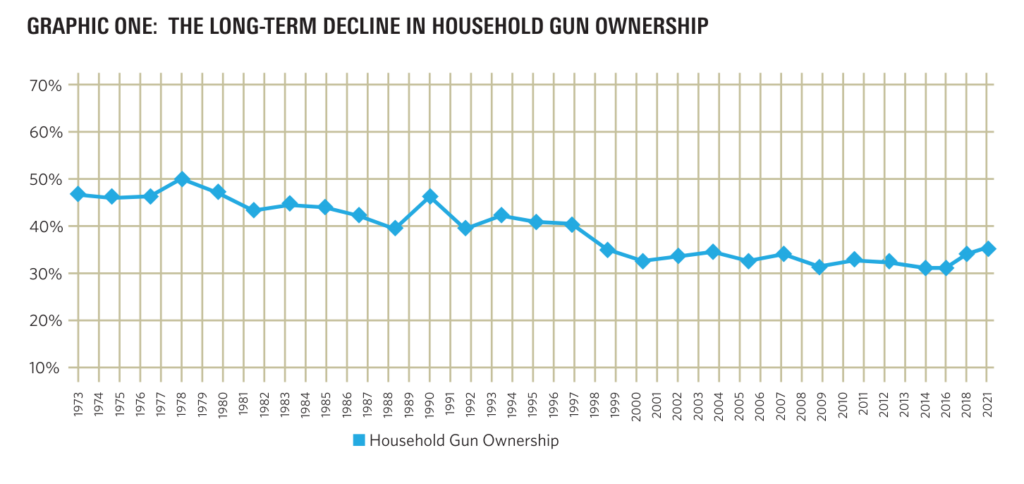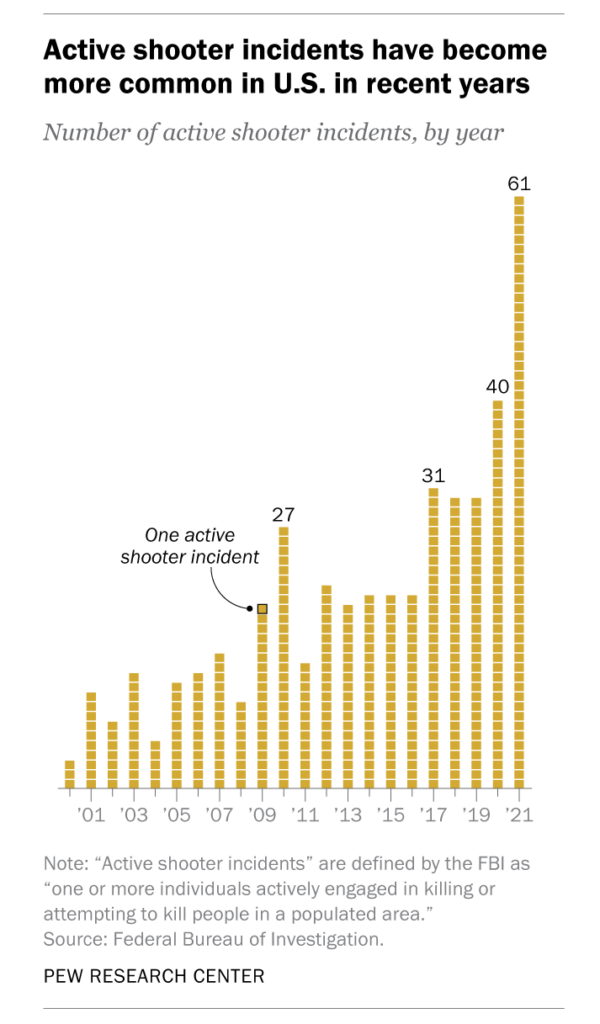Reality: Kennedy has repeatedly emphasized that he does not plan to confiscate firearms or restrict Second Amendment rights. The data shows gun ownership levels have remained the same while mental health issues have drastically increased. He stresses the need for a comprehensive approach that includes better mental health care and understanding the underlying factors contributing to violence, rather than simply imposing gun restrictions.
RFK Jr.’s Position on Gun Ownership
Robert F. Kennedy Jr. has been profoundly impacted by gun violence with the tragic assassinations of his father, Robert F. Kennedy, in 1968, and his uncle, President John F. Kennedy, in 1963. However, in various interviews Kennedy has reiterated his commitment to protecting Second Amendment rights while seeking to address the complex factors contributing to gun violence. In response to a question about banning assault weapons, RFK Jr. stated:
“I am not going to take people’s guns away. If there was consensus where Republicans and Democrats voted a majority to do that, I would sign the bill.”
He acknowledges that significant changes to gun laws would require bipartisan support, which is currently very unlikely given the strong opposition to gun restrictions among Republicans. However, the data shows that guns are not causing the increase in mass shootings.
Gun Ownership and Violence Data
Contrary to the notion that reducing gun ownership would decrease violence, data shows a different trend. According to the Violence Policy Center, gun ownership rates have remained relatively stable since the early 2000s, with only slight fluctuations.

Active Shooting Incidents
Data from the Pew Research Center indicates a rise in active shooting incidents over the years, despite stable gun ownership rates. This suggests that other factors are contributing to the increase in violence.

The Role of Mental Health
Rising violence, particularly among younger individuals, correlates more closely with increasing mental health issues than gun ownership. Research by the American Psychological Association highlights a significant increase in mental health disorders among young Americans over the past decade:
- Major depression in adolescents increased by 52% from 2005 to 2017.
- Serious psychological distress in young adults increased by 71% from 2008 to 2017.
- Suicidal thoughts and attempts among young adults increased by 47% from 2008 to 2017.
Kennedy continually emphasizes that studies should be done to find out why this is happening.
RFK Jr.’s Policy on Addressing Gun Violence
In a NewsNation Townhall, Kennedy elaborated on his approach to addressing gun violence:
Audience Question: I want to know how are you going to use federal resources to slow and or end the epidemic of gun violence in America.
RFK Jr.: Thank you for that question. For me, it’s a very tough question. You know, I lost my father to gun violence. I lost my uncle to gun violence, and many friends. So, I’m aware and sensitive to the injuries that that can cause to generations.
We have a gun problem in this country. We have a Supreme Court now that has given a very expansive view of the Second Amendment. I believe in the Constitution, including the Second Amendment. Practically, I do not believe that there is, within that Second Amendment, that there is anything we can meaningfully do to reduce the trade and ownership of guns and I’m not going to take people’s guns away.
Because telling the people that I’m gonna take their guns away is not practical. Anybody who tells you that they’re going to have a reduced gun violence through gun control at this point, I don’t think is being realistic. I think we have to figure out other ways to do that. I think we have to figure out other ways to reduce that violence.
Ultimately, my hope is that we can bring Americans together, get them to trust each other, get them to trust their government again, and then we can work out. You know, every American, whether their a Republican gun carrier a Democrat who is, you know, who believes that nobody should own guns, we all want the same thing. We want to keep our children safe and want to keep our neighborhoods safe.
I think we have to look at what the alternatives are for doing that. Some of the things I’ve talked about are that we need to look at some of the other causes of violence. One is the division among Americans, and the hatred, we need to reduce that. The distrust of government, need to reduce that. We also need to look at the contribution, you know, particularly with the school shootings of some of these psychiatric drugs. I’m not saying they’re causing it, I’m saying there is evidence they are and that evidence…
Interviewer: What’s that evidence?
RFK Jr.: Well, part of the evidence includes the fact that for SSRIs, almost all of them have on their manufacturers inserts, among the listed side effects, are homicidal and suicidal behavior.
Interviewer: That doesn’t mean antidepressants caused any of these people to commit mass shootings.
RFK Jr.: Of course it doesn’t. But we ought to be looking at it, shouldn’t we? Should we be looking at video games, and cell phones, and some of the social media stuff. We should be looking at all these things, including the SSRI’s. By the way, there are studies out there that indicate a higher percentage of the people who committed the school violence were on SSRIs.
Interviewer: Yeah, but they’re also like ten’s and ten’s of millions of Americans on antidepressants who don’t commit mass shooting.
RFK Jr.: Of course. There are people who smoke cigarettes and don’t get cancer. Shouldn’t we be looking at those things? Something happened in this country. Something happened that we can’t really explain and that we need to explain. NIH really ought to be explaining it to us, but it doesn’t do these studies. It will not do the studies where there may be a big shot as the culprit.
You know when I was a kid, many of the schools that my friends attended had gun clubs in them. The kids brought their rifles to school every day and nobody was shooting children. In all of human history, all of the nations in the world, there’s never been a time when people randomly went into a group of children and start shooting them. Why did this suddenly start? Why is it not happening in Switzerland, which has, you a comparable number of guns per capita that we have?
Interviewer: No, we have far more guns per capita.
RFK Jr.: We have far more, but they have a lot of guns, but their last school shooting was 21 years ago. We’re having them every 21 hours.
Interviewer: We have few more questions we want to get to. But very quickly in ten…
RFK Jr.: But do you believe we shouldn’t even look at that issue?
Conclusion
Robert F. Kennedy Jr., someone affected by the gun violence himself, is committed to finding balanced, effective solutions to reduce violence. He respects the cultural significance of gun ownership for many Americans and supports democratic processes in determining gun policy. Given the current political landscape, significant gun restrictions are unlikely to gain bipartisan support, making the claim that Kennedy will take away guns both misleading and unfounded.
Kennedy’s focus is on evidence-based measures that starts with good scientific studies, not on infringing on the rights of responsible gun owners. It is crucial to understand the full context of his statements and to understand the data on gun ownership, as well as mental health throughout the years.